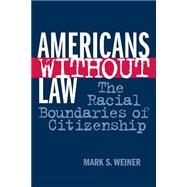Americans Without Law
, by Weiner, Mark Stuart- ISBN: 9780814793640 | 0814793649
- Cover: Hardcover
- Copyright: 6/1/2006
View the Table of Contents. Read the Introduction.A rich and exceptionally clear account of the meaning-making context and constitution of citizenship. --Christine Harrington, Institute for Law and Society, New York UniversityMark Weiner provides a rare and radical insight into the racial structures of American law. Reading this racial history through the rhetoric of case law decisions--juridical racialism--provides a dramatic sense of the anthropological scope of what law has done and potentially continues to do. --Peter Goodrich, Cardozo School of LawAn enthralling mixture of personages and cases that reveals much about the intimate combining of law and 'American' imperialism, including the complicities of scholarship. --Peter Fitzpatrick, Birkbeck School of Law, University of LondonJuridical racialism is legal rhetoric infused with Anglo-Saxon racial superiority and Weiner shows how it operated from the Gilded Age to the decision in Brown v. Board of Education. Reading the news, one wonders if it is not still operating today. --John Brigham, University of Massachusetts, AmherstAmericans Without Law shows how the racial boundaries of civic life are based on widespread perceptions about the relative capacity of minority groups for legal behavior, which Mark S. Weiner calls juridical racialism. The book follows the history of this civic discourse by examining the legal status of four minority groups in four successive historical periods: American Indians in the 1880s, Filipinos after the Spanish-American War, Japanese immigrants in the 1920s, and African Americans in the 1940s and 1950s.Weiner reveals the significance of juridical racialism for each group--and, in turn, Americans as a whole--by examining the work of anthropological social scientists who developed distinctive ways of understanding racial and legal identity, and through decisions of the U.S. Supreme Court that put these ethno-legal views into practice. Combining history, anthropology, and legal analysis, the book argues that the story of juridical racialism shows how race and citizenship served as a nexus for the professionalization of the social sciences, the growth of national state power, economic modernization, and modern practices of the self.






